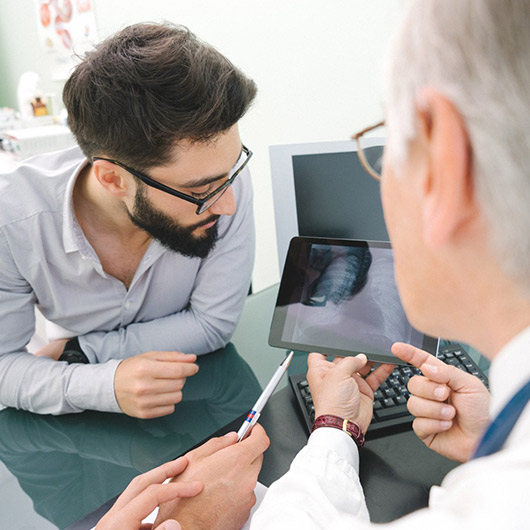NJ Great-grandmother Breathes Better After COPD Treatment

May 09, 2024
Frances Clark, 73, struggled with breathing difficulties for many years. First diagnosed with asthma by her family doctor more than 10 years ago, she used an inhaler to manage symptoms. But her condition worsened, and she was diagnosed with chronic obstructive pulmonary disease (COPD), a lung disease that restricts airflow and makes it hard to breathe.
Fran, who lives in Garfield, New Jersey, with her husband, Jim, remembers one of the worst times her symptoms flared up. After the police were called, she was brought into the emergency room by ambulance. “It was horrible. I couldn’t get air in or out,” she says. “In my mind, I can still see the officer running to me with an oxygen tank and a mask.”
COPD Affecting Her Everyday Life
After one of these flare-ups, Fran started seeing Nadeem Ali, M.D., a pulmonologist at Hackensack University Medical Center, in 2018.
Dr. Ali says her symptoms were challenging to control. “Fran was having a lot of issues with simple things, like detergents and weather changes, that would trigger her breathing,” he says. Over the years, Dr. Ali treated Fran with inhalers, antibiotics, steroids, asthma injections, supplementary oxygen and pulmonary rehab. “She was on maximum treatment for someone with COPD and still progressively worsened.”
Fran says it felt like she was a fish out of water. Day-to-day tasks, like climbing stairs or taking a shower, became increasingly difficult. She took oxygen with her whenever she left the house in case of a flare-up.
A grandmother of 10—now a great-grandmother—Fran wanted to feel well enough to spend time with her family. “We had a nice long conversation about her quality of life and the fact that she had a lot of things happening with her family—graduations and whatnot—that she wanted to be able to participate in and not be pushed around in a wheelchair,” says Dr. Ali.
Adds Fran: “I was afraid I wouldn't be able to participate in all the precious times with my family and friends.”
Breathing Better New COPD Treatment
Dr. Ali recommended a promising new option called Zephyr Endobronchial Valve treatment, the first minimally invasive procedure that helps COPD patients without major surgery—available at Hackensack and at JFK University Medical Center. The valves allow air to deflate out of the diseased part of the lung so that the healthy areas can function more efficiently and patients can breathe more easily.
The procedure is a good option for high-risk patients who aren’t candidates for more invasive options like a lung transplant. “It's usually for people who are older, people who are frail or people who are sick and have cardiac problems and other issues, as well,” says Dr. Ali.
Fran was on board with the new treatment plan. She was the first patient at Hackensack to undergo the procedure. After a three-day stay in the hospital—the norm for this procedure—she was able to go home.
Even before she left, Fran noticed an improvement in her breathing. “I felt better the first night,” she says. “I walked all the way around the nurse’s area into another room, and I don’t think I could have done that before. I was breathing fine. The valves were working.”
While a cure for COPD is still outstanding, treatments like the Zephyr Valve can greatly improve the quality of life for people struggling to breathe, as they have for Fran.
“We continue her maximum therapy. We don't decrease that because, while she has improved her symptoms, she hasn’t been cured,” says Dr. Ali. “We're not going to tell you we have a cure for COPD or we're going to make everything normal. But we can make your breathing better and allow you to walk more so you can improve your quality of life and enjoy your time with your family.”
Next Steps & Resources
- Meet our source: Nadeem Ali, M.D.
- To make an appointment with Nadeem Ali, M.D., or a pulmonologist near you, call 800-822-8905 or visit our website.
- Learn more about pulmonology services at Hackensack Meridian Health.
- Take our lung cancer health risk assessment.
The material provided through HealthU is intended to be used as general information only and should not replace the advice of your physician. Always consult your physician for individual care.





